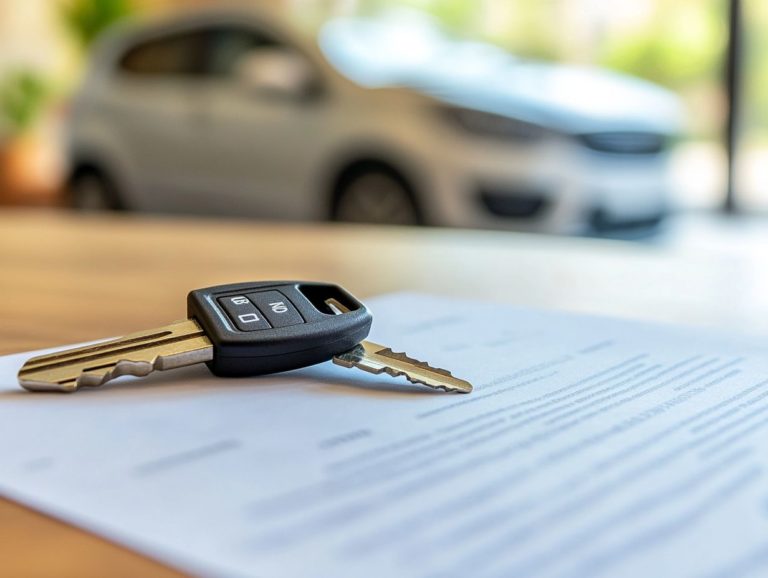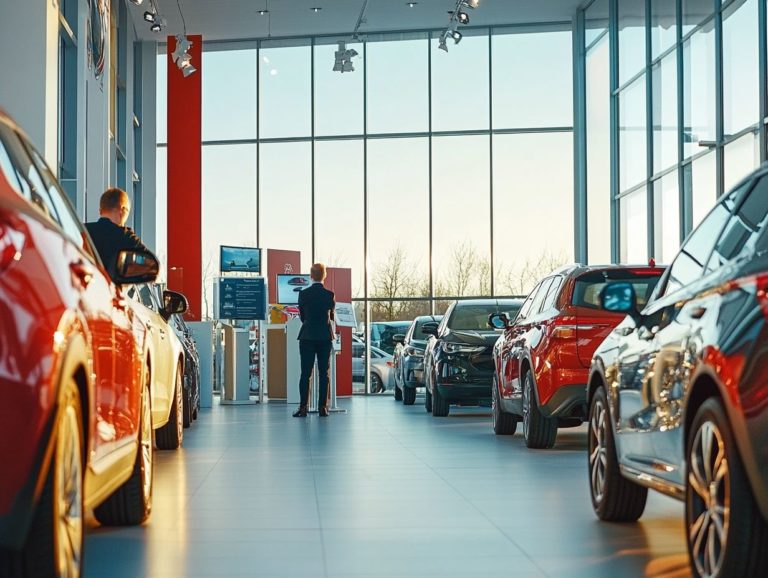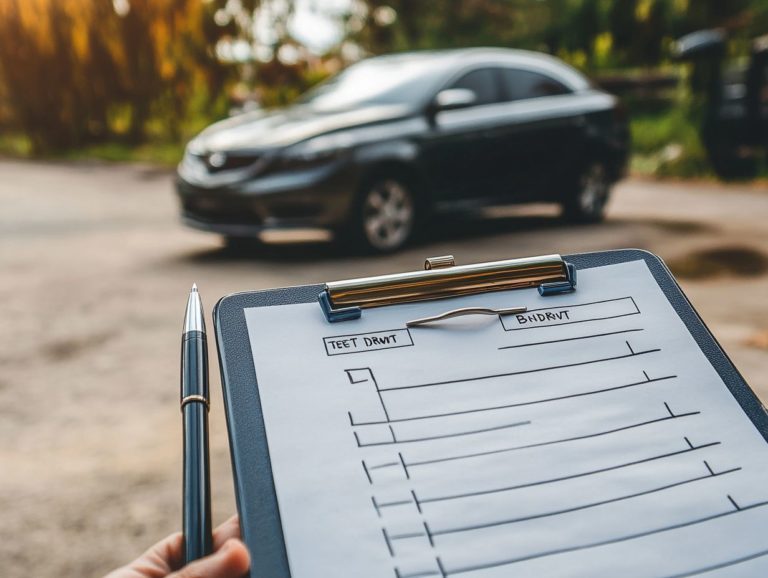Evaluating the True Cost of a New Car
Purchasing a new car may seem like a simple task. However, the total cost goes well beyond just the sticker price.
This article delves into many factors that shape the true cost of ownership. These include depreciation, insurance, and maintenance. You ll find practical budgeting tips and clever saving strategies that empower you to make a well-informed decision before you drive off the lot.
Whether you re a first-time buyer or a seasoned driver, grasping these elements will enable you to navigate the financial intricacies of car ownership with greater confidence and ease.
Contents
- Key Takeaways:
- The True Cost of a New Car
- What Impacts Your Car Costs?
- Gas and Fuel Efficiency
- Calculating the Total Cost of Ownership
- Tools and Methods for Accurate Calculation
- Ways to Save on Car Costs
- Negotiating the Price
- Final Considerations Before Buying a New Car
- Frequently Asked Questions
- What factors should I consider when evaluating the true cost of a new car?
- How can I determine the true cost of a new car before making a purchase?
- Why is it important to consider the true cost of a new car?
- Are there any hidden costs to be aware of when evaluating the true cost of a new car?
- How can I save money when evaluating the true cost of a new car?
- Wondering if a pricier, fuel-efficient car is worth it? Let s break it down!
Key Takeaways:
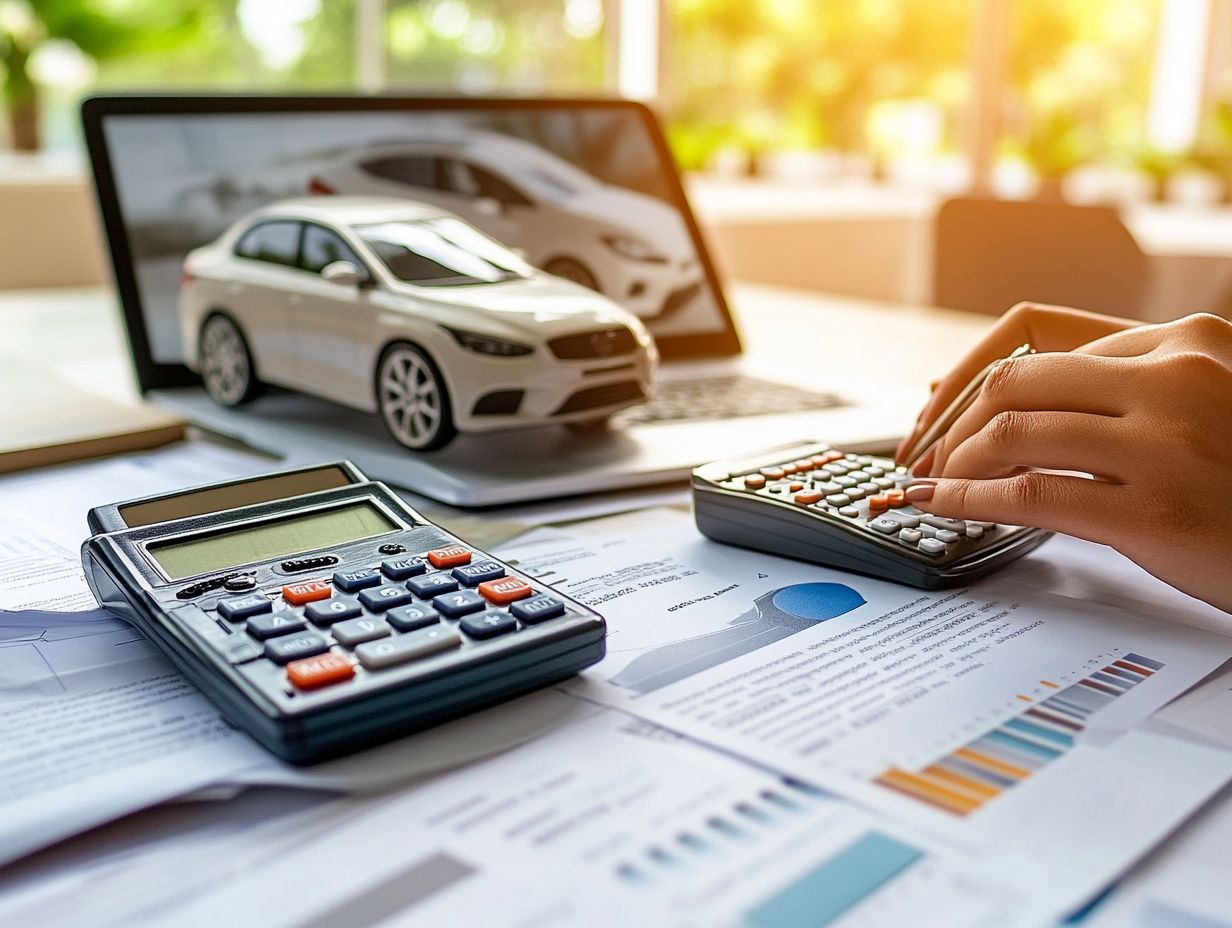
- Fully understanding all costs involved in owning a new car is crucial in making an informed purchase decision.
- Factors such as depreciation, insurance, maintenance, and fuel efficiency all play a significant role in the true cost of a new car.
- Utilizing tools and methods to accurately calculate the total cost of ownership can greatly impact your savings. Implement cost-saving strategies like negotiating, buying used, and maximizing fuel efficiency.
The True Cost of a New Car
Understanding the true cost of owning a new car requires careful evaluation of various financial factors. These factors will impact your budget and lifestyle. For a comprehensive approach, consider learning how to budget for your new car purchase, as car ownership extends beyond just the initial purchase price; it includes ongoing expenses that can significantly influence your financial well-being.
From depreciation costs the loss of value over time to insurance and maintenance, every aspect plays a role in your total financial commitment. With the average price of new vehicles on the rise, as highlighted by the U.S. Bureau of Labor Statistics and AAA data, it’s crucial to consider the full scope of car expenses.
This includes consumer expenditures related to gas prices and financing options. Make sure you re well-prepared for the financial journey ahead.
Understanding the Different Costs Involved
When you’re contemplating the purchase of a vehicle, it s essential to grasp the many costs involved. These range from maintenance and insurance to fuel and other driving expenses. Each factor plays a unique role in the overall cost of car ownership, which can differ significantly based on the vehicle type you select.
For instance, regular gasoline cars might lead to higher fuel costs, particularly in regions where gas prices fluctuate. On the other hand, high-maintenance luxury vehicles can quickly escalate repair bills.
In contrast, electric vehicles often shine in terms of lower maintenance needs due to their fewer moving parts. This can allow you to cut back substantially on monthly fuel expenses.
Insurance premiums vary dramatically based on the car’s make and model. Typically, high-performance vehicles cost more to insure than standard sedans. Knowing these factors can save you money and stress in the long run!
Understanding these diverse elements not only sheds light on the immediate costs but also reveals the long-term financial implications that differ across vehicle categories.
What Impacts Your Car Costs?
Several factors influence the costs tied to car ownership from the type of vehicle you choose to depreciation and insurance premiums. Grasping these dynamic elements is vital for you as a prospective car buyer looking to make informed financial decisions.
Different vehicle categories, like small sedans versus medium SUVs, come with their own unique depreciation rates and maintenance needs. Moreover, factors like gas and fuel efficiency significantly impact your overall driving costs.
As you explore these considerations, think about how each factor interrelates to shape your potential costs in owning a car.
Depreciation
Depreciation plays a crucial role in the overall cost of owning a car. It significantly affects the average prices of new vehicles and influences the long-term value of your investment. Understanding how depreciation varies across different vehicle categories is essential for you as a prospective buyer.
For instance, you might find that mainstream sedans tend to lose about 50% of their value within five years. In contrast, high-end SUVs can depreciate by as much as 60% during the same timeframe. This rapid decline in value can cause significant financial losses if you ignore these factors.
Some brands are better at holding their value than others. Brands known for reliability, such as Honda and Toyota, typically experience slower depreciation rates. By analyzing historical data and trends, you can tailor your vehicle choices to find options that not only align with your lifestyle but also maintain their value over time. This approach leads to smarter financial investments.
Insurance
Insurance plays a pivotal role in the overall costs of car ownership. It significantly influences your expenses depending on various factors, including the type of vehicle you choose and your personal driving record. The average insurance cost can fluctuate considerably, with financial institutions providing differing rates based on their risk evaluations and coverage options. Understanding how these costs are calculated helps you make informed decisions when selecting a vehicle, potentially leading to substantial savings over time.
Several factors come into play here. The type of vehicle you insure can greatly impact your premiums; luxury cars often come with higher costs due to their repair expenses and theft statistics. Your personal driving record also affects your rates; safer drivers typically enjoy lower insurance costs.
Research suggests that opting for higher deductibles can help reduce your monthly premiums. This strategy enables you to create a more tailored insurance package that aligns with your financial circumstances. By grasping these intricacies, you can navigate the complexities of auto insurance with greater ease and enhance your overall budgeting strategy.
Maintenance and Repairs
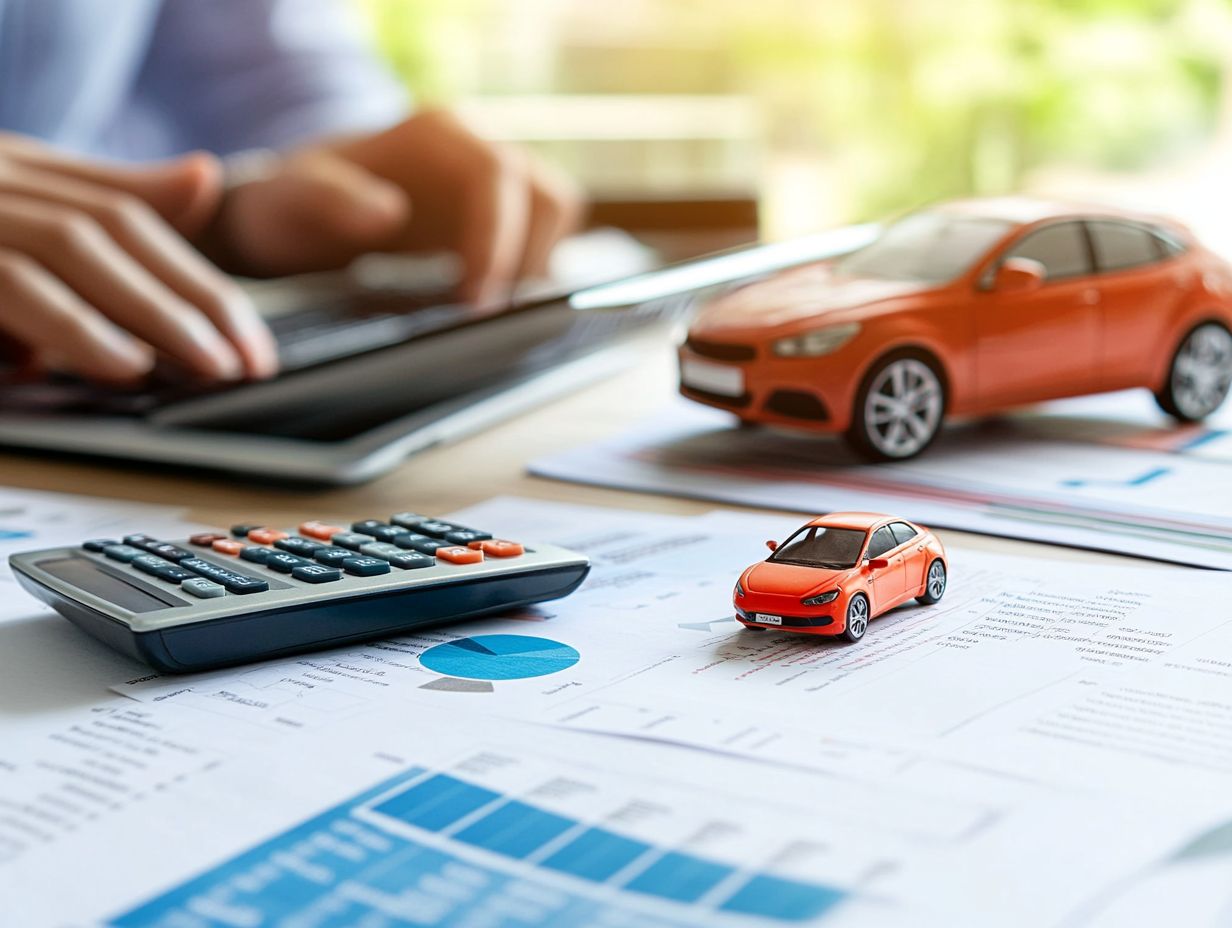
Maintenance and repair costs are crucial factors in your journey as a car owner. They influence both your long-term expenses and the reliability of your vehicle. Depending on the type of vehicle you choose be it hybrid, electric, or traditional these costs can vary significantly. Grasping these differences enables you to budget effectively and manage ongoing expenses tied to vehicle upkeep. Regular maintenance is not just about performance; it also plays a pivotal role in preserving your vehicle’s resale value over time.
For instance, owning a luxury vehicle often means facing higher repair costs due to the need for specialized parts and services. In contrast, compact cars might provide a more wallet-friendly maintenance experience. To keep these expenses in check, prioritize routine inspections and follow the manufacturer s service schedules. Invest in quality parts when replacements become necessary.
Statistics show that, on average, consumers allocate about 10% of their annual budget to vehicle-related costs. Therefore, setting aside funds specifically for maintenance is a smart move. By taking a proactive stance and budgeting for these potential costs, you can avoid unexpected financial strains and keep your vehicle running smoothly for years to come.
Staying proactive with your vehicle can save you money and hassle in the long run! Consider researching maintenance options and assessing your driving habits to ensure a cost-effective ownership experience.
Gas and Fuel Efficiency
Gas prices and fuel efficiency shape your driving costs. They significantly influence your overall car ownership expenses.
As fuel prices fluctuate, understanding your vehicle’s fuel economy can lead to notable savings. Electric vehicles and hybrids typically offer superior fuel efficiency compared to traditional gasoline vehicles, reducing long-term fuel costs.
By weighing these factors, you can make informed decisions that positively impact your financial situation.
In today s market, the average American spends a considerable amount annually on fuel. Those with less efficient vehicles feel the financial strain more acutely. Studies indicate that electric vehicles can cost as little as half the price of gas cars for the same distance traveled, highlighting their financial allure.
Hybrids present a balanced alternative. They deliver better mileage while still retaining some conventional fuel capabilities.
For instance, the average hybrid achieves around 50 miles per gallon, while many gas-only models struggle with just 25. Exploring these options enables you to optimize your budget while minimizing your environmental impact.
Calculating the Total Cost of Ownership
Calculating the total cost of ownership is crucial for current and prospective car owners. This approach encompasses every expense associated with owning a vehicle over time.
It enables you to evaluate not just the initial purchase price but also ongoing costs like maintenance, insurance, fuel, and depreciation.
By using various tools and methods for precise calculations, you can make well-informed financial decisions about your vehicle investment. Assessing the total cost of ownership helps you grasp your financial commitment more clearly and budget effectively.
Tools and Methods for Accurate Calculation
Utilizing the right tools and methods to calculate the total cost of ownership is essential for effective budgeting and financial planning in your car ownership journey. Many factors need consideration, including how much a car loses value over time and potential taxes.
Many banks and credit unions provide online calculators that incorporate loan interest rates and projected resale values. These tools offer invaluable insights into your financial responsibilities.
Platforms such as Edmunds and Kelley Blue Book present estimated costs based on various vehicle models, guiding you in making informed decisions.
To maximize the benefits of these tools, regularly review and update your assumptions about fuel prices and insurance rates. This ensures your projections remain relevant and reflect current market conditions.
Ways to Save on Car Costs
Finding ways to save on car costs is crucial for easing the financial burden of car ownership. Numerous strategies can help reduce expenses, from negotiating the price of a new vehicle to considering the benefits of buying used or leasing.
Optimizing fuel efficiency helps lower your overall driving costs. Implementing these methods can unlock substantial savings, making your financial commitments much more manageable.
Negotiating the Price
Negotiating the price of a new car can unlock significant savings. It s a vital skill for anyone in the market. Understanding vehicle prices and the average costs of similar models empowers you to negotiate effectively with dealers and secure better deals.
Financial institutions often offer valuable insights into market trends. This information provides you with the confidence and knowledge to navigate the negotiation process.
Diving into recent reports helps you spot pricing fluctuations and identify the best times to purchase, like end-of-quarter sales or during new model releases.
Leveraging online resources such as pricing calculators and comparison tools builds a strong foundation for your negotiations. Research shows that factors like dealer incentives and financing options can greatly influence the final price.
Armed with this information, strategically counter offers to ensure the deal you receive reflects both current market conditions and your own budgetary requirements.
Buying Used or Leasing
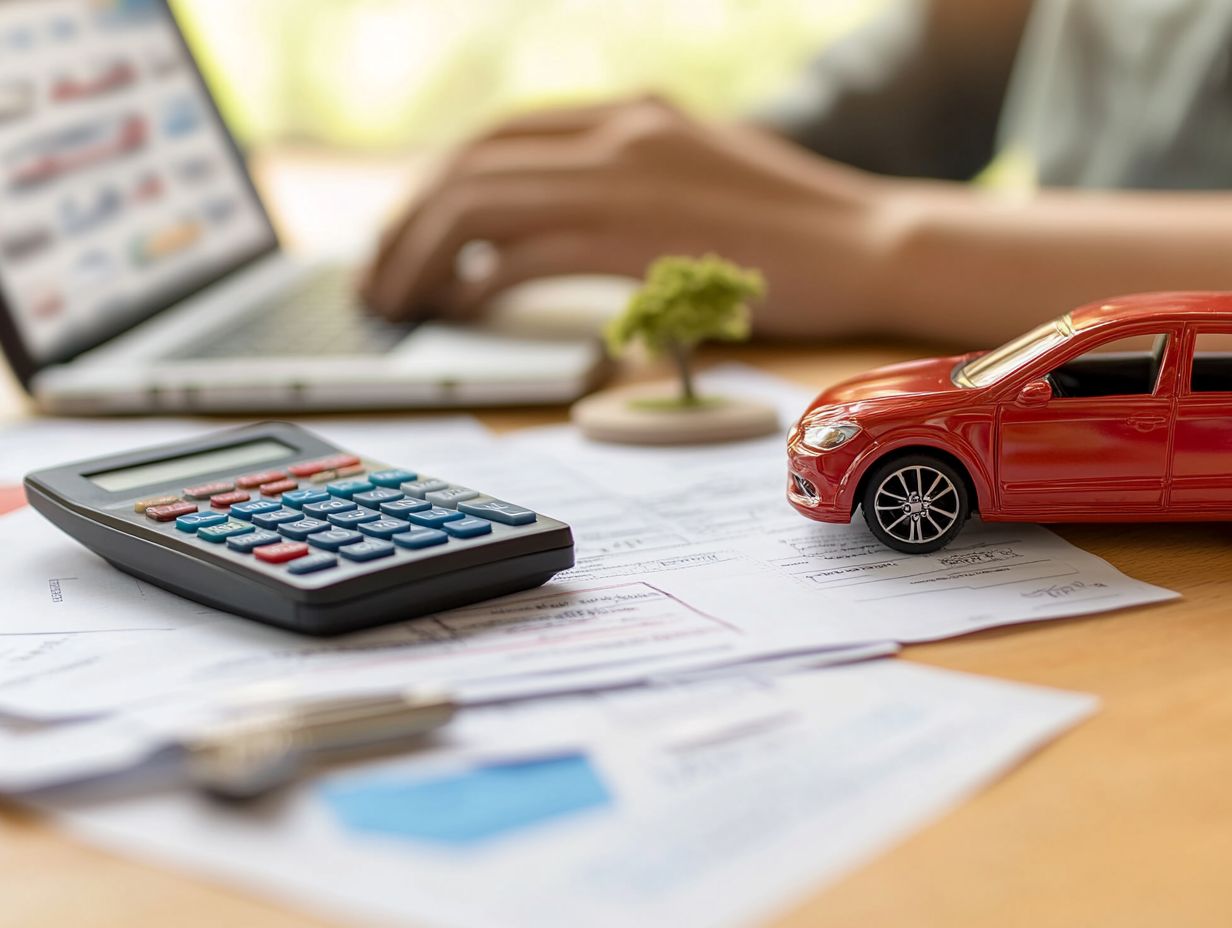
Buying a used vehicle or leasing can dramatically reduce your costs of owning a car. This option is often more affordable than purchasing new.
When you weigh the long-term implications, opting for a used car often results in a much lower overall investment. New vehicles tend to lose value rapidly in their first few years. Insurance is generally more affordable for used cars, leading to substantial savings over time.
Leasing also allows you to enjoy the thrill of driving a newer model every few years. This is particularly appealing if you value the latest features and technology. While leasing has its perks such as lower initial costs and warranty coverage for repairs and maintenance throughout the lease you should be mindful of mileage restrictions, which means there are limits on how many miles you can drive the car without incurring extra fees, and potential extra charges at the end of the lease.
Check out financing options from banks and credit unions that fit your needs. By carefully assessing these options, you can make a well-informed choice that aligns with your financial circumstances and driving habits.
Maximizing Fuel Efficiency
Maximizing fuel efficiency is a savvy strategy for slashing your overall driving costs. It can also soften the blow of those ever-fluctuating gas prices. By grasping the fuel economy of your vehicle and adopting efficient driving habits, you can enjoy significant savings over time.
Staying attentive to maintenance schedules and choosing the right fuel types can enhance your vehicle s performance and longevity. For instance, regularly checking your tire pressure can boost gas mileage by up to 3%, as under-inflated tires create unnecessary drag. Keeping a clean air filter is another game-changer; studies reveal that a well-maintained filter can enhance fuel efficiency by as much as 10%.
Employing soft driving techniques like gradual acceleration and maintaining a moderate speed can lead to savings of about 20% on fuel. Implementing these strategies transforms fuel efficiency into a practical way to save money at the pump, leading to real savings over time.
Final Considerations Before Buying a New Car
Before committing to purchasing a new car, it’s crucial to address a few final considerations, especially regarding budgeting and long-term financial implications. You need to evaluate not just the upfront costs but also the ongoing expenses tied to car ownership, such as insurance, maintenance, and fuel prices.
By planning ahead and gaining a clear understanding of how these factors will impact your overall financial situation, you enable yourself to make informed decisions that align beautifully with your financial goals.
Budgeting and Planning Ahead
Budgeting and planning ahead are essential for ensuring your car ownership experience remains financially manageable. By setting realistic budgets that account for all the costs associated with owning a vehicle, you can steer clear of unexpected financial burdens that might arise later on.
When you consider the complete range of expenses, it s not just about the initial purchase price. You also need to factor in insurance, maintenance, fuel, and registration fees. Many find it beneficial to use techniques like detailed spreadsheets or budgeting apps that help track ongoing expenses. This proactive approach allows you to assess your financial standing with greater accuracy.
Engaging with financial advisers or institutions can unlock resources like personalized loans or payment plans that align with your long-term financial goals. By leveraging these tools, you can navigate the world of car ownership with increased confidence and security.
Long-term Financial Impact
Understanding the long-term financial impact of car ownership is crucial for making informed purchasing decisions. Factors like depreciation costs and ongoing expenses related to maintenance, insurance, and fuel can affect your finances over time.
Being aware of these impacts will help you choose vehicles that align with your financial aspirations while minimizing future strain.
The moment you drive a vehicle off the lot, it typically begins to lose value often by 20% or more within the first year. This stark reality highlights the importance of weighing both immediate and long-term costs associated with owning a car.
Ongoing expenses can accumulate quickly, diverting funds from other potential investments. To ease these financial pressures, consider researching models celebrated for their durability and resale value. Explore alternative transportation options, like car-sharing services, which allow you to rent cars for short periods. This could better suit your lifestyle and protect your financial well-being.
Frequently Asked Questions
What factors should I consider when evaluating the true cost of a new car?
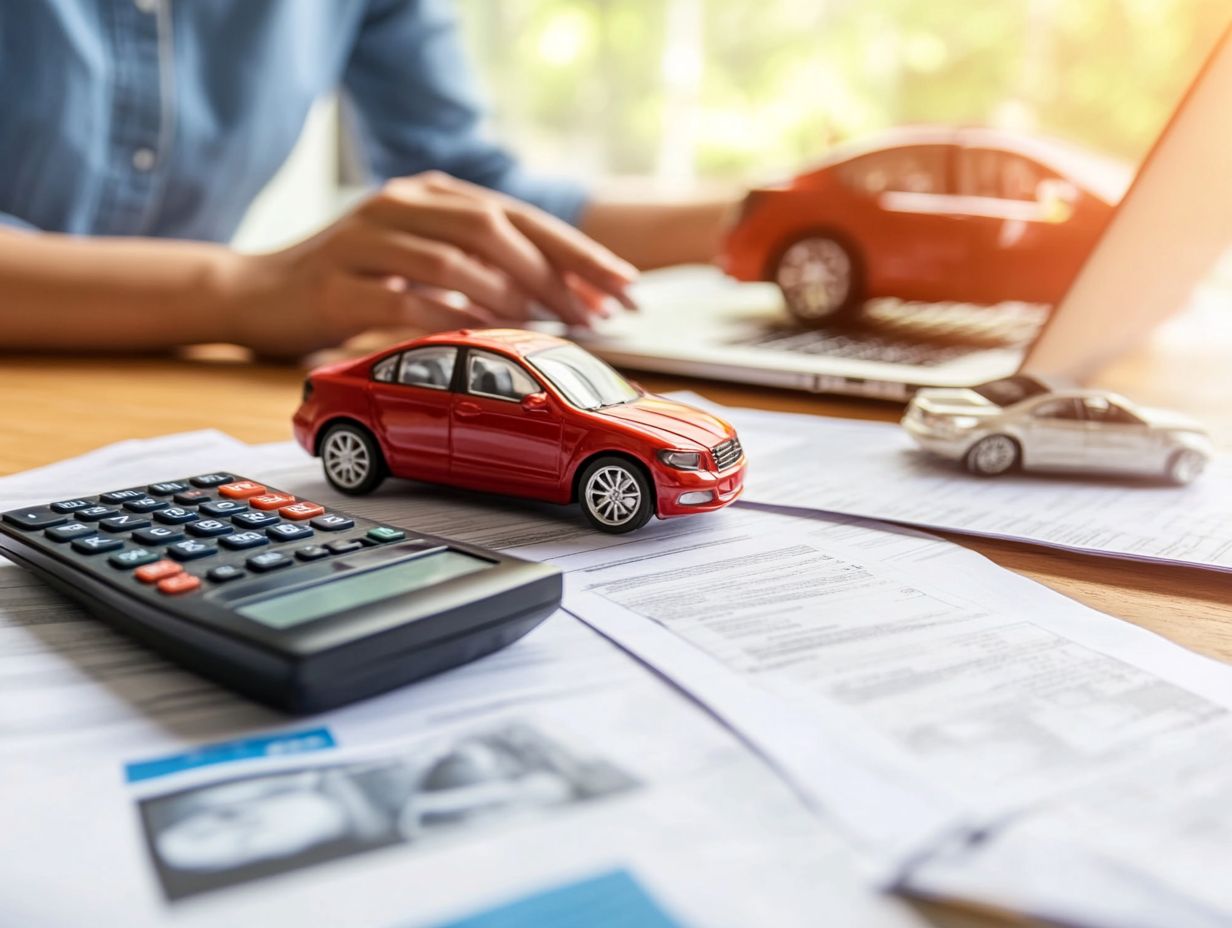
When evaluating the true cost of a new car, consider the purchase price, financing options, insurance rates, maintenance and repair costs, and understanding the total cost of car ownership in terms of fuel efficiency.
How can I determine the true cost of a new car before making a purchase?
You can determine the true cost of a new car by researching the vehicle’s fuel efficiency, insurance rates, and average maintenance and repair costs. Additionally, understanding the hidden costs of car ownership is crucial, so don’t forget to factor in any applicable taxes or fees.
Why is it important to consider the true cost of a new car?
Considering the true cost of a new car allows you to make a more informed decision and avoid unexpected expenses. To aid in this process, learning how to evaluate new car deals effectively helps you budget and plan for the long-term costs of owning a new car.
Yes, there may be hidden costs such as dealer fees, extended warranties, and add-ons that can significantly increase the overall cost of a new car. Don’t let hidden costs catch you off guard! It’s important to carefully review and understand all costs before making a purchase.
How can I save money when evaluating the true cost of a new car?
You can save money by researching different financing options, comparing insurance rates from multiple providers, and considering the long-term maintenance and repair costs of different vehicle models.
Wondering if a pricier, fuel-efficient car is worth it? Let s break it down!
It depends on your individual needs and budget. While a higher-priced car with better fuel efficiency may save you money on gas in the long run, it may not be worth it if the purchase price and maintenance costs are significantly higher.
Have more questions? Comment below, and let s discuss!


